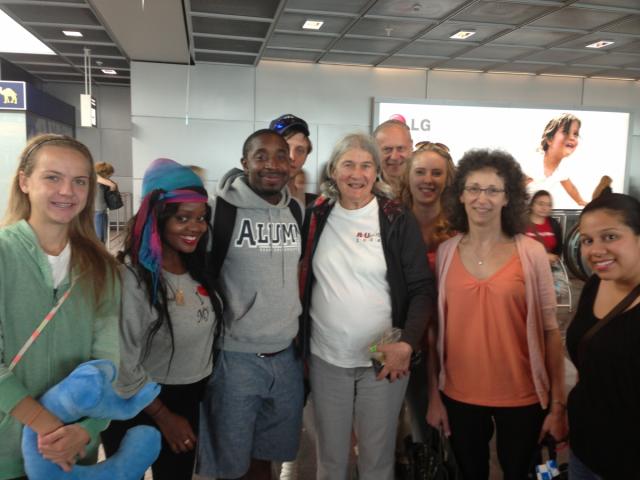Opportunities (Holocaust and Genocide Studies M.A.)
Degree candidates, taking advantage of the Master of Arts in Holocaust and Genocide Studies' substantial opportunities, are poised for significant professional careers as interpreters of genocide and its considerable global repercussions.
- Present papers at international conferences
- Elect the dual masters degree option in human rights at the UK’s University of Leicester School of Law (pending final agreement)
- Elect the Certificate in Teaching the Holocaust and Prejudice option
- Benefit from the program’s attractive scholarship opportunities
- Receive offers to intern at human rights organizations in New York City and the United States Holocaust Memorial Museum in Washington, DC
- Compete favorably for Ph.D. programs elsewhere
- Participate in program-sponsored study delegations abroad where genocide occurred and still resonates
Summer 2013 Delegation To Poland And Bosnia
From July 8 through July 19, nine participants, under the auspices of Kean University’s Master of Arts in

Holocaust and Genocide Studies, toured Europe where genocide was planned and implemented. The study delegation, which benefited from a collaboration with the International Network of Genocide Scholars, was the first multinational study tour of its kind open to the public. A grant from a Kean University alumna made it possible for many of the delegates to participate.
The tour focused on the local origins of genocide in Poland and Bosnia and on how citizens in these two countries are negotiating their memories. Dr. Keith Nunes, an expert on genocide and international law, and an adjunct in the Holocaust and Genocide Studies program, led the tour and organized visits with scholars, jurists, witnesses, and human rights activists. Dr. Dennis Klein, the director of the program who conceptualized the delegation, believes the delegation fulfills the program’s goals of combining scholarship with activism: “We are offering our students exceptional opportunities to learn how the dynamics of genocide imbue contemporary global politics and culture.”
Among the visited sites were the Wannsee Villa in Berlin, where the Final Solution was articulated; the Center for Research on Antisemitism and the Topography of Terror, also in Berlin; the Sachsenhausen Concentration Camp outside Berlin; the village of Jedwabne in Poland, the subject of a recent study exposing the local origins of genocide; Polish members of the Helsinki Foundation for Human Rights; the village of Srebrenica in Bosnia, another site of local killing; and members of several Bosnian human rights initiatives, including the Human Rights Center at the University of Sarajevo. The group met with some 16 local authorities and other citizens, including scholar Jan Grabowski and activists Marian Turski, a survivor of the Lodz ghetto and Auschwitz.
Ben Chewey, a second-year degree candidate, was especially moved by Bosnia. “Because the memory of

genocide there [from 1992 to 1995] is still fresh, observing the raw anguish of survivors was especially emotional for me. The nation is still clearly broken, but we saw heartening signs of commitment to its future.”
William Chalmers, also a second-year degree candidate, is writing about his experiences as part of the requirements for credit and as part of a grant he received from the university with two other degree candidates. The grant-supported project is providing historical context for the tour and will serve as the basis for university and academic-conference presentations this year as well as for their masters theses.
The Holocaust and Genocide Studies program is planning a second trip to locations where genocide occurred. “These visits,” said Dr. Klein, “will culminate in a course on comparative genocide that we will offer for the first time in fall 2014. The second tour will be open to students but to citizens anywhere who are seeking a deeper understanding of how genocide occurs, who is responsible, and how we observers and students can influence the world’s response.”

Picture captions (in displayed order)
1. The delegates arrive in Berlin. From left to right: Stephanie Nawracaj, Darline Allen, William Chalmers, Benjamin Chewey, Marcia Dube, Prof. Keith Nunes (trip guide), Courtney Ritter, Susan Elfenbein, Sandra Landaverde (missing from photo: Jessica Brenner)
2. Sandra Landaverde and Courtney Ritter in Warsaw
3. Benjamin Chewy at the Berlin Brandenburg Gate